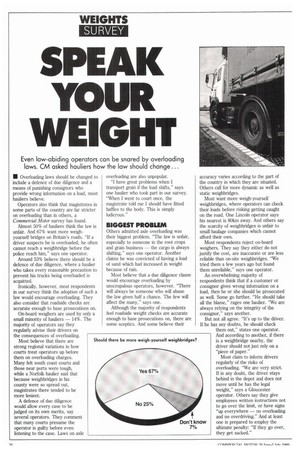SPEAK YOUR WEIGHT
Page 38

If you've noticed an error in this article please click here to report it so we can fix it.
Even law-abiding operators can be snared by overloading laws. CM asked hauliers how the law should change...
• Overloading laws should be changed to include a defence of due diligence and a means of punishing consignors who provide wrong information on a load, most hauliers believe.
Operators also think that magistrates in some parts of the country are far stricter on overloading than in others, a Commercial Motor survey has found.
Almost 50% of hauliers think the law is unfair. And 67% want more weighyourself bridges on Britain's roads. "If a driver suspects he is overloaded, he often cannot reach a weighbridge before the police reach him," says one operator.
Around 53% believe there should be a defence of due diligence, where a haulier who takes every reasonable precaution to prevent his trucks being overloaded is acquitted.
Ironically, however, most respondents in our survey think the adoption of such a law would encourage overloading. They also consider that roadside checks are accurate enough to base prosecutions on.
On-board weighers are used by only a small minority of hauliers — 14%. The majority of operators say they regularly advise their drivers on the consequences of overloading. Most believe that there are strong regional variations in how courts treat operators up before them on overloading charges. Many felt south coast courts and those near ports were tough, while a Norfolk haulier said that because weighbridges in his county were so spread out, magistrates there tended to be more lenient.
A defence of due diligence would allow every case to be judged on its own merits, say several operators. They comment that many courts presume the operator is guilty before even listening to the case. Laws on axle overloading are also unpopular.
"[have great problems when I transport grain if the load shifts," says one haulier who took part in our survey. "When I went to court once, the magistrate told me I should have fitted baffles to the body. This is simply ludicrous."
BIGGEST PROBLEM
Others admitted axle overloading was their biggest problem. "The law is unfair, especially to someone in the root crops and grain business — the cargo is always shifting," says one operator. Another claims he was convicted of having a load of sand which had increased in weight because of rain.
Most believe that a due diligence clause would encourage overloading by unscrupulous operators, however, "There will always be someone who will abuse the law given half a chance. The few will affect the many," says one.
Although the majority of respondents feel roadside weight checks are accurate enough to base prosecutions on, there are some sceptics. And some believe their accuracy varies according to the part of the country in which they are situated. Others call for more dynamic as well as static weighbridges.
Most want more weigh-yourself weighbridges, where operators can check their loads before risking getting caught on the road. One Lincoln operator says his nearest is 80km away. And others say the scarcity of weighbridges is unfair to small haulage companies which cannot afford their own.
Most respondents reject on-board weighers. They say they either do not justify the cost, are inaccurate or are less reliable than on-site weighbridges. "We tried them a few years ago but found them unreliable," says one operator.
An overwhelming majority of respondents think that if a customer or consignor gives wrong information on a load, then he or she should be prosecuted as well. Some go further. "He should take all the blame," rages one haulier. "We are always relying on the integrity of the consignor," says another.
But not all agree. "it's up to the driver. If he has any doubts, he should check them out," states one operator.
And according to another, if there is a weighbridge nearby, the driver should not just rely on a "piece of paper."
Most claim to inform drivers regularly of the risks of overloading. "We are very strict. If in any doubt, the driver stays behind in the depot and does not move until he has the legal weight," says a Gloucester operator. Others say they give employees written instructions not to go over the limit, or have signs "up everywhere — no overloading and no overdriving." And at least one is prepared to employ the ultimate penalty: "If they go over, they get sacked."




















































































































































